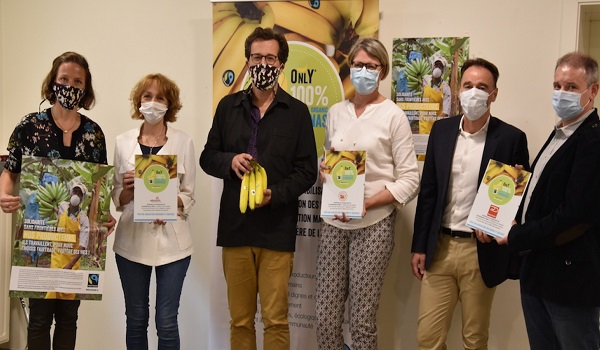 Credit: Fairtrade Lëtzebuerg
Credit: Fairtrade Lëtzebuerg
The Fairtrade Lëtzebuerg NGO has called for a national duty of vigilance law for companies aimed at protecting human rights and the environment in value chains.
The banana industry, already heavily marred by cases of abuse of power and human rights violations, must now face the COVID-19 pandemic and its consequences on the ground.
The introduction of curfews in places like Machala (nicknamed the banana capital of the world) in Ecuador has only led to increased human rights violations, with plantation staff being authorised to work additional hours and resume harvesting in unfavourable conditions: often there is a lack of protective equipment and no possibility of social distancing in warehouses. According to Fairtrade Lëtzebuerg, banana plantation workers are among the most vulnerable, due to particularly sensitive respiratory tracts and an immune system weakened by toxic pesticides that are regularly applied to these plantations.
Across the world, millions of people who produce agricultural raw materials for the global market have been faced with the same dilemma in recent months: continue working to survive or stay at home to protect themselves.
Alongside the increased risks to their health, workers are faced with an increase in the cost of living, both for foodstuffs and for care and protection products. In Peru, for example, a black market has developed for the purchase of tests but also oxygen. This situation further exacerbates existing inequalities in the regions concerned.
The COVID-19 crisis adds to an already particularly difficult context for the banana sector: poor wages, unsigned employment contracts and a lack of social protection are commonplace. In response to the pandemic, Fairtrade International, of which Fairtrade Lëtzebuerg is a member, has temporarily adapted part of its standards to allow producer organisations to take immediate measures to protect health and livelihoods of their producers, workers and community.
The Fairtrade premium is used to detect and treat coronavirus contamination and to help families. In the Peruvian APPBOSA cooperative, from which the majority of BIO-Fairtrade bananas sold on the Luxembourg market come, the premium was used to finance the purchase of masks, protective gloves, ventilators and disinfection products, as well as to buy basic consumer goods. On large farms, premium management committees can distribute up to 100% of the Fairtrade premium in the form of cash payments to workers.
The NGO warned, however, that global value chains, in their current forms, do not place enough value on the people who work in the production of raw materials, on the populations of the countries where they are grown or on the negative effects of this production on the environment. There is an increasing call for more sustainability and transparency in the banana sector, aiming to force companies to include externalised costs in their calculations.
The organisation maintained that this vicious circle of human and environmental exploitation can only be broken if multinationals pay a decent price in the long-term, including the external social and environmental costs of banana production. Fairtrade Lëtzebuerg, which is a member of the Duty of Vigilance Initiative, is also advocating for a national duty of vigilance law for human rights and the environment for companies so that such violations in value chains cease permanently.








